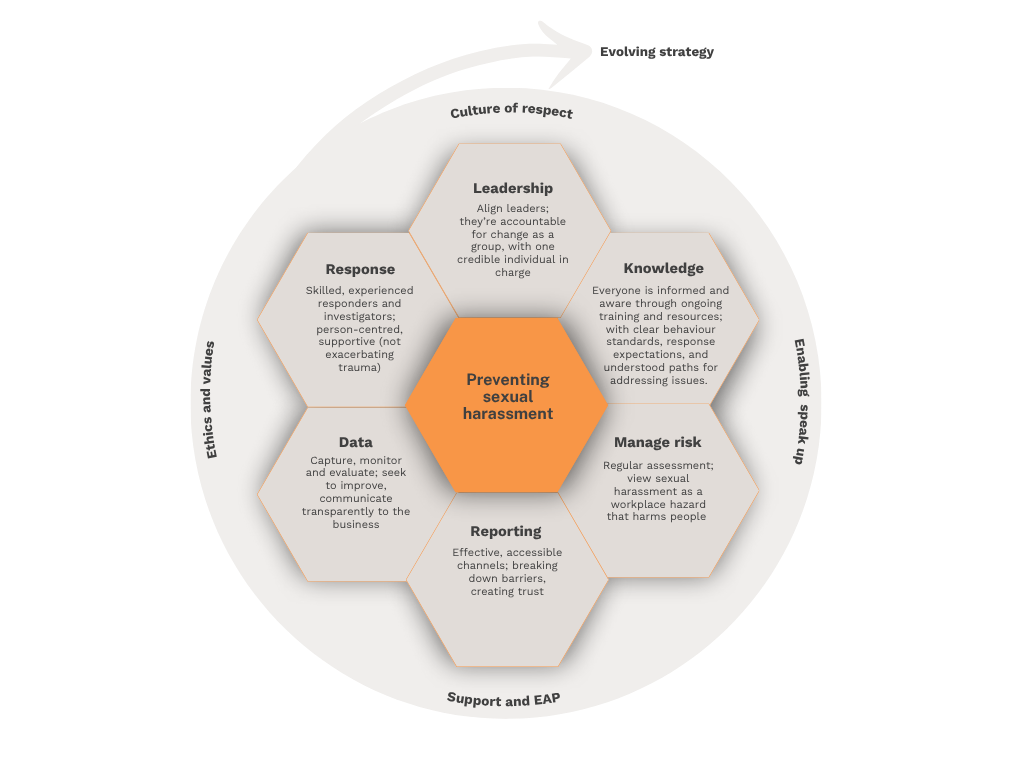The UK’s Worker Protection Act came into force last October; now is the time for all employers to act.
A recent report chaired by Baroness Harriet Harman KC found that bullying, harassment and sexual harassment are widespread and systemic at the Bar; stressing that radical and decisive change is required to protect people in the sector, uphold ethical standards and prevent a further #MeToo moment.
Experienced lawyer and byrne·dean Director and Head of Training, Helen Dallimore, responds on how law firms must respond.
Even if they’re not directly part of the Bar, law firms can’t look away.
Many of the same cultural risk factors often exist for law firms too: hierarchy; power dynamics; lack of diversity at the senior level; late night working; competitive settings and the fear of speaking up and the potential career implications of doing so.
Although there are additional factors relevant to the Bar, including the self-employed nature of working in chambers, law firms also need to consider these other risks and the cultures they are creating and enabling.
Also, the relationship between law firms and the Bar means there are inevitable interconnections and crossovers; law firms need to be mindful of the risks for their own staff potentially experiencing the inappropriate conduct and behaviour the report highlights when working with barrister chambers.
Law firms’ legal and regulatory duties
Some legal and regulatory duties already apply to law firms, too.
The Workplace Culture Thematic Review by the SRA highlighted the risk of toxic and unsupportive cultures in law firms; it cited systemic bullying, discrimination and harassment and the failure to address unacceptable behaviours when complaints are raised. Following this, the SRA expanded the Code of Conduct to contain the following obligations:
“You treat colleagues fairly and with respect. You do not bully or harass them or discriminate unfairly against them.”
“If you are a manager you challenge behaviour that does not meet this standard.”
Interestingly, the guidance states that the term colleagues applies to people formally employed by the firm or organisation in which a solicitor works and to others with whom the solicitor works closely, including, potentially barristers and experts who may be instructed by the firm.
The need for managers to be proactive here and call out / challenge behaviour is clearly required by the SRA.
And since October 2024, there has been a duty on all UK employers to take reasonable steps to prevent sexual harassment, which has further required law firms to be proactive and to manage and address risks. The focus on this will only continue under the Employment Rights Bill, which is looking to expand the duty to require all reasonable steps and also revive employer liability for third party harassment.
A meaningful organisational response from law firms must focus on culture - beyond issuing statements or updating policies
It starts with culture. Culture is contagious and it drives conduct. If firms want to prevent harassment, they need intentional and strategic cultures of respect, not just policies filed away somewhere.
Firms need to create cultures where problematic behaviours cannot thrive; this will help manage risk and also drive engagement of staff, attract the best talent and keep people safe. Firms should be proactively fostering a culture of respect, psychological safety and zero tolerance of harassment.
That doesn’t just happen; it has to be intentional. It takes strategy and leadership. At byrne·dean, we have been working with law firms for many years to support them with this and increasingly so since the legal and regulatory duties have come into focus.
Role modelling and setting the tone from the top is fundamental, with partners and others buying into and seeing the importance of creating positive and respectful cultures. Also, in line with a zero tolerance approach – making sure that everyone is accountable and appropriate, proportionate action is taken however much they bill and regardless of seniority.
On a practical note, listening to your people and conducting cultural and strategic reviews are useful to identify the current issues and risks and to know what you’re dealing with. Anonymous speak up channels provided by people like our partners InChorus can help greatly (other providers are of course available).
The importance of training as a part of the response
One of the urgent conclusions in Harman’s report is the need for mandatory and regular anti-harassment training across the legal profession.
Effective training does not just explain the law. It changes behaviour, makes the issues real, and equips everyone to play their part.
In terms of the legal duty to take reasonable steps to prevent sexual harassment, there are inevitably some things that should be covered in training. The Equality and Human Rights Commission (EHRC) Employer 8-step guide on preventing sexual harassment states that workers, including managers and senior staff, should be trained on: what sexual harassment in the workplace looks like; what to do if they experience and witness it; and how to handle any complaints of harassment.
This is far more than just knowing about the law (particularly when you’re training lawyers). Understanding the practical and behavioural as well as some of the key legal aspects is crucial. There's a world of difference between knowing definitions and actually understanding problematic behaviours: how they manifest and impact and, fundamentally, how to prevent and address them in practice.
Training should do more than inform - it must resonate, inspire action, and ensure that everyone sees their role in tackling these issues. It’s too easy for people to see this sort of training as not aimed at them, just at bad actors - people who harass, bully or cause problems for others. It’s not. It’s for everyone and it’s about how we react to and challenge such behaviour just as much as how we manage our own actions. It’s about creating behavioural change. Getting people (whatever their role) to connect with the issues and understand why they must address them and what they can do.
In byrne·dean training, we use tried and tested models and tools to get people talking to each other about the workplace they want to work in. We manage the emotion in the room – some people may be feeling defensive, others may have experienced issues and be finding it challenging. We facilitate and navigate the conversation, so everyone can feel safe to talk through and try to navigate the issues.
We also do exercises to show how we all can see things differently and to recognise that our own view of the world is not the only view. A lot around harassment and bullying can be subjective. One person’s normal (or normalised behaviour) can be another’s extreme. We ensure everyone sees themselves as accountable, the consequences when things go wrong, and what they can do to manage and resolve issues early.
Training is vital, but preventing harassment ultimately takes more. It needs leadership, effective reporting, skilled responses, good data, ongoing knowledge, and active risk management — all underpinned by strategy, values and a culture of respect. The diagram below shows the holistic approach needed.
Please get in touch if you want to talk through how the lessons learned in the legal sector can help enable your organisation to be a positive and respectful workplace - driving engagement at the same time as managing risk.

Visit here to learn more about preventing sexual harassment in your workplace.
Related Articles

Guest Q&A - Sarah and Hannah from BlueSky on motherhood in the legal profession

Alcohol at work events - getting the right balance of risk vs engagement






